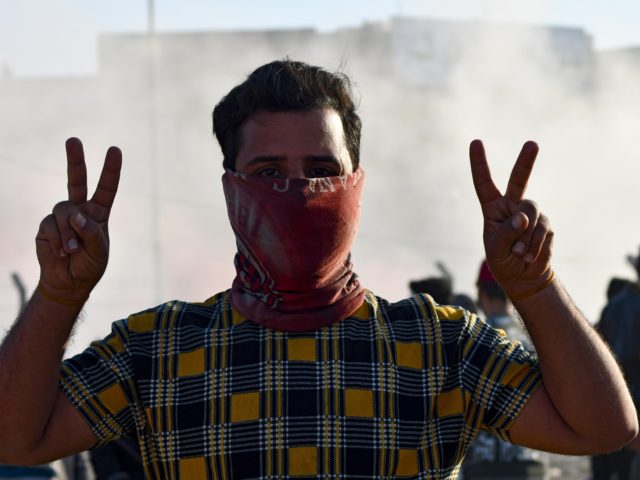Anti-government protests launched in southern Iraq last week spread to the national capital, Baghdad, on Monday, the Kurdish news agency Rudaw reported.
Demonstrators attempted to fill Baghdad’s Tahrir Square on March 1 in an act of solidarity with protesters in the southern Iraqi city of Nasiriyah, where at least ten people died and 200 more were injured following violent clashes between residents and Iraqi security forces last week.
“Riot police intervened to disperse the demonstrators and prevented them from reaching Tahrir Square, using batons and tear gas canisters,” witnesses told Rudaw’s English service on Monday. Other locals told the news agency that Baghdad’s “Jumhuriyah Bridge, which connects Tahrir Square to the [capital’s diplomatic] Green Zone, had been blocked by security forces completely.”
“A large number of security forces were deployed to various parts of the city,” a protester named Saif Kareem told Rudaw.
Residents of Nasiriyah, the capital of Iraq’s Dhi Qar province, defied a coronavirus lockdown mandate last week to participate in the city’s years-long anti-government protest movement, which calls for officials to reform the capital’s poor public services, such as water and electricity. An estimated 600 people have died as a result of the protests since they began in 2019 and quickly spread across Iraq. The anti-government movement had largely dissipated last year due to the Chinese coronavirus pandemic but resurged in Nasiriyah last month.
Demonstrators gathered outside Nasiriyah’s main government building on February 25 to demand that Dhi Qar Governor Nazem al-Waeli resign “over a deterioration in public services,” Agence France-Presse (AFP) reported.
The demonstration turned violent after protesters set fire to the government headquarters.
“They threw stones at security forces, who fired shots in the air to try to disperse the crowds,” an AFP correspondent on the scene relayed.
Waeli resigned from his post as Dhi Qar governor on February 26 following the violent clashes.
The head of Iraq’s National Security Agency, Abdul Ghani al-Asadi, was appointed Dhi Qar province interim governor in Waeli’s stead. The Iraqi federal government has further tapped Asadi to form an investigative committee to probe the violence in Dhi Qar province last week.
Iraqi state authorities arrested four people in the southeastern city of Basra on February 14 “on suspicion of being behind assassinations of activists and journalists,” AFP reported last month, noting the arrests were the first known detentions related to the Nasiriyah-based protests, whose participants have allegedly been targeted for assassination in some cases.
“An intelligence force managed to arrest four suspects within a network of 16 people responsible for the assassinations that targeted activists in Basra,” an unnamed Iraqi security official told AFP.

COMMENTS
Please let us know if you're having issues with commenting.